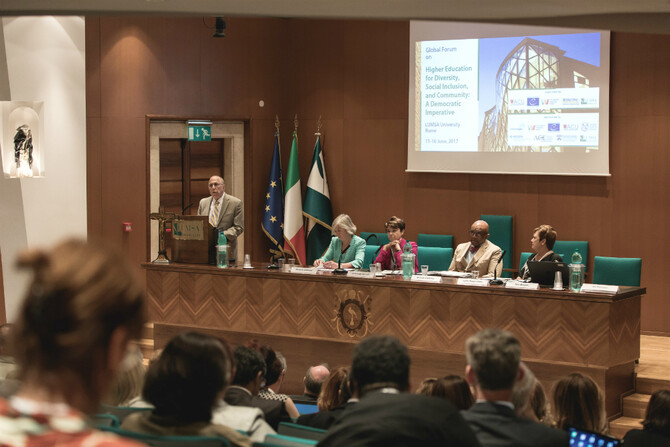Penn’s Netter Center Expands Global Impact and Outreach
A university-wide center at the University of Pennsylvania is playing a leading role in how higher-education institutions can guide democratic principles and serve as anchors of community-engagement around the world.
The Barbara and Edward Netter Center for Community Partnerships houses the International Consortium for Higher Education, Civic Responsibility and Democracy. A core component of the Consortium is to build partnerships that promote democracy, human rights and the rule of law through international dialogue.
In June, the International Consortium, along with the Council of Europe and the European Wergeland Centre, welcomed nearly 130 educational, non-profit and governmental leaders in Rome for “The Global Forum on Higher Education for Diversity, Social Inclusion and Community: A Democratic Imperative.”
The fifth Global Forum drew representatives from the United States, nearly 30 European countries, Asia, Australia, South Africa and the Middle East. Participants grappled with topics such as the role of higher education in the current political environment, opportunities and challenges that immigrant populations may bring and how universities can serve as anchor institutions to better engage their communities.
Tony Gallagher, the acting head of social sciences, education and social work at Queen’s University Belfast, in Northern Ireland, says the Global Forum provides him with the chance to meet with his colleagues who are forging new ideas on the civic and democratic role of higher education.
“In the aftermath of the economic crisis, we face the emergence of populist politics and a rising tide of non-rationalism in which debate based on evidence and consideration is being displaced by arguments centered on emotion, which are then amplified through social media,” says Gallagher. “The work we do has never been more important. In the midst of all these crises, the future is being shaped right now and it is imperative that higher education commits itself to the highest ideals of democracy and civic engagement and ensures that the voice for inclusion and participation rings loud in the current storm of ideas.”
Heather Campbell, a professor of town and regional planning at the University of Sheffield in England, agrees that the Global Forum was particularly well-timed.
"Confronted by a world of growing inequality and new forms of political expression and democratic debate, the overall message was that universities could not, and should not, rest comfortably,” Campbell says. “As globalized processes take effect and have impact on communities locally, the value of the knowledge generated by universities and the education provided will be proven in our own backyards."
One of the International Consortium’s strengths, she says, is its work to provide venues for sharing experiences but also its ability to prompt critical reflection and learning. By doing so, she says, it re-energizes everyone by drawing attention to what’s possible in the future.
Gallagher says that, with each meeting, the breadth of experience and expertise continues to expand, invigorating Global Forum attendees.
One topic of great interest to Global Forum participants was “Where do we go from here?”
Ira Harkavy, the associate vice president and founding director of the Netter Center who co-chaired the forum, says the centrality of higher education has never been clearer.
Drawing upon his new book, co-authored with Penn colleagues, Knowledge for Social Change: Bacon, Dewey and the Revolutionary Transformation of Research Universities in the 21st Century, Harkavy's remarks referenced the works of 17th century philosopher Francis Bacon, 20th century educator John Dewey and Penn's founder, Benjamin Franklin, at the Global Forum.
“Universities have an increasing responsibility to contribute to the advancement of knowledge and improvement of the human condition,” says Harkavy, “including creating and sustaining genuinely diverse, inclusive, democratic communities and societies.”
Encouraging college presidents, vice chancellors, academics and administrators to look to the past for guidance about the future, Harkavy introduced a modern twist on Dewey’s ideas and tipped his hat to Franklin, who believed that education should have the humanitarian goal to serve mankind.
“Global collaboration for research, learning and engagement are necessary if we are to realize the progressive vision of a better, more just and democratic world,” Harkavy says.
Sjur Bergan, forum co-chair and head of the Education Department, Directorate of Democratic Citizenship and Participation/DG Democracy of the Council of Europe, is a key figure in the partnership. Bergan points to instances in more recent history that reflect the same ideas. He says he remembers well the period nearly 30 years ago when Europe underwent a period of substantial democratic change. He recalls it wasn’t enough then to only change laws and institutions; there had to be a change in the culture itself and that’s what the annual forum stimulates.
Says Bergan, “Democratic institutions and laws will not function unless they are built on democratic culture: a set of attitudes and behaviors that are developed through education. The Global Forum allows us to learn from each other’s experiences, strengths and weaknesses. When we stand together, democracy and human rights are stronger.”
Harkavy says he hopes that this year’s Global Forum will yield an increased commitment among leaders to advancing a culture of democracy and a better grasp of how higher education can work in a democratic fashion with nearby communities to promote inclusion and diversity.
“The Global Forum fosters conversation and deliberation, advancing the global movement that sees higher education as a way to realize Bacon’s goal of advancing knowledge for the ‘relief of man’s estate,’ as well as Dewey’s vision of an organic ‘great community’ composed of participatory, democratic, collaborative and independent societies,” Harkavy says.
The day before the forum, a small invitational converence sponsored by the Council of Europe and the Anchor Institutions Task Force brought together higher education leaders from across Europe. The Task Force, which Harkavy chairs, now counts 700 leaders in higher education and other anchor institutions among its members. Leaders met to discuss best practices and explore democratic civic partnerships involving colleges, universities, and other anchor institutions, including community foundations, libraries and arts institutions.








